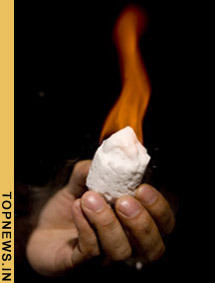 Washington, March 24: Researchers have reported that gas hydrates, known as “ice that burns”, which is derived from chunks of ice that workers collect from beneath the ocean floor, show increasing promise as an abundant, untapped source of clean, sustainable energy for the future.
Washington, March 24: Researchers have reported that gas hydrates, known as “ice that burns”, which is derived from chunks of ice that workers collect from beneath the ocean floor, show increasing promise as an abundant, untapped source of clean, sustainable energy for the future.
These so-called “gas hydrates,” a frozen form of natural gas that bursts into flames at the touch of a match, may one day may fuel cars, heat homes, and power factories.